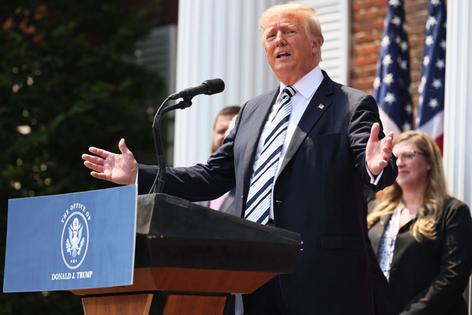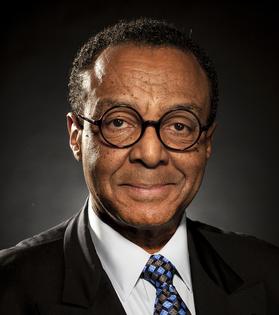Donald Trump vs. Big Tech: If You Can’t Beat ’Em, Raise Money Off of ’Em
Former President Donald Trump’s lawsuit against Facebook, Twitter and Google’s YouTube social networks is a lot like his presidency: full of sound and fury, signifying spectacular fundraising opportunities. m’
Yet, as often happens in his political quests, he also manages to raise some important questions that have troubled other people’s minds, such as mine, about the runaway growth and power of the tech giants, even as he provides pitifully inadequate answers.
Trump’s gripes with Big Tech are well-known and deeply felt. His beloved Twitter account was booted offline two days after the Jan. 6 attack by hundreds of his supporters on the Capitol. Soon he and his supporters lost accounts on Facebook, Instagram, Snapchat, Twitch, Spotify, Shopify and others.
Of course, he’s perfectly free to move his account or set up a social network of his own, as he immediately threatened to do. But his attempts to find an alternative network were roundly rebuffed and he scrubbed his new blog page, “From the Desk of Donald J. Trump,” after less than a month.
With that, he demonstrated how much of a near-monopoly the big tech firms hold on the market for social networks. But as the failure of once-popular networks such as Myspace and Friendster — remember them? — show, a near-monopoly doesn’t mean competition is dead, even when it seems to be ailing.
Nevertheless, Trump has turned to the courts in a lawsuit that charges “censorship” violations of his First Amendment rights by the tech giants, even though the First Amendment specifically protects speech from interference by government, but not by private-sector companies.
To get around that important technicality, Trump, as the lead plaintiff in a class-action lawsuit he filed Wednesday in the U.S. District Court for the Southern District in Florida, makes the far-fetched argument that the tech companies are “state actors,” which the Constitution describes as a person acting on behalf of a government body. Similar arguments have failed in the past, legal scholars say, which is not surprising, since Facebook appears to be acting on behalf of itself, not a government body.
In other words, the First Amendment cuts both ways. It protects free speech and free press, including efforts to force your speech or press onto somebody else’s tech company against their wishes.
Yet, I begin to argue with myself when I am troubled by the concentration of power that allows the big three tech firms to have such outsized power in determining who and how many can participate in the internet’s public square.
Even Facebook founder Mark Zuckerberg, apparently hoping to avoid government action, formed an Oversight Board to handle cases like Trump’s complaint. The board kicked Trump’s suspension back to Zuckerberg, complaining that the “indefinite” ban was too open-ended. The company decided to suspend Trump’s account for two years, then “look to experts to assess whether the risk to public safety has receded.”
For now, the banishment appears to have cooled some of the inflammatory falsehoods. Online misinformation about election fraud plunged 73% after the mass suspension, a study by Zignal Labs found.
The San Francisco-based analytics firm also reported that conversations about election fraud dropped from 2.5 million mentions to 688,000 mentions across several social media sites in the week after Trump was banned from Twitter.
Efforts such as Trump’s “Stop the Steal” movement, along with kooky extremists such as the QAnon folks, undermine the credibility of free elections, the keystone of our democracy.
The challenge for our democracy is to create and maintain a public square in which bad speech can be countered with good speech. Unfortunately, the inexact art of screening zillions of social media messages every day and night for dangerous words and images too often overdoes its job, and perfectly innocent messages get swept up in the process.
That’s a customer relations problem for Facebook and the other tech giants to work out. The future of their business model hangs in the balance, perhaps along with the future of our democracy. We already may be slipping into the nightmare of infotainment that educator Neil Postman warned about in his prophetic 1985 classic, “Amusing Ourselves to Death.”
Meanwhile, fundraising emails for Trump’s court fight went out immediately after its filing, indicating once again that no crisis in politics is too great for somebody to make a buck from it.
========
(E-mail Clarence Page at cpage@chicagotribune.com.)
©2021 Clarence Page. Distributed by Tribune Content Agency, LLC.
(c) 2021 CLARENCE PAGE DISTRIBUTED BY TRIBUNE MEDIA SERVICES, INC.










